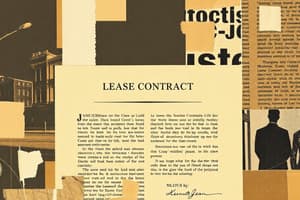Podcast
Questions and Answers
ما هو تعريف عقد الإيجار؟
ما هو تعريف عقد الإيجار؟
- عقد ينظم تأجير المال فقط
- اتفاقية بين طرفين تتعلق باستخدام الممتلكات (correct)
- اتفاقية لنقل ملكية الممتلكات
- اتفاقية لشراء الممتلكات بشكل فوري
من هو المؤجر في عقد الإيجار؟
من هو المؤجر في عقد الإيجار؟
- الطرف الذي يستخدم الممتلكات المستأجرة
- الطرف الذي يمتلك الممتلكات المؤجرة (correct)
- الطرف الذي يدفع الإيجار
- الطرف الذي يطلب الإيجار
ما هو المقصود بـ 'المستأجر' في عقد الإيجار؟
ما هو المقصود بـ 'المستأجر' في عقد الإيجار؟
- الشخص الذي يستخدم الممتلكات مقابل دفع الإيجار (correct)
- الشخص الذي يمتلك العقار
- الشخص الذي يشارك في كتابة العقد
- الشخص الذي يعيد تأجير الممتلكات
ما هو 'الإيجار' في سياق عقود الإيجار؟
ما هو 'الإيجار' في سياق عقود الإيجار؟
ما هي العناصر الأساسية لعقد الإيجار؟
ما هي العناصر الأساسية لعقد الإيجار؟
ما هو نوع العقد الذي يتعلق بتأمين الأصول أو المخاطر؟
ما هو نوع العقد الذي يتعلق بتأمين الأصول أو المخاطر؟
أي من العقود التالية يتم استخدامها لتأمين استخدام عقار لفترة معينة مقابل أجر؟
أي من العقود التالية يتم استخدامها لتأمين استخدام عقار لفترة معينة مقابل أجر؟
ما الفرق الرئيسي بين عقد الإيجار وعقد التأمين؟
ما الفرق الرئيسي بين عقد الإيجار وعقد التأمين؟
أي من الخيارات التالية يمثل مثالا على عقد يتطلب دفع أقساط منتظمة؟
أي من الخيارات التالية يمثل مثالا على عقد يتطلب دفع أقساط منتظمة؟
ماذا يغطي عقد التأمين بشكل أساسي؟
ماذا يغطي عقد التأمين بشكل أساسي؟
من الأطراف المشاركة في عقد الإيجار؟
من الأطراف المشاركة في عقد الإيجار؟
ما الذي يجب أن يتضمنه عقد الإيجار بشكل أساسي؟
ما الذي يجب أن يتضمنه عقد الإيجار بشكل أساسي؟
ماذا يحصل عليه المستأجر في عقد الإيجار؟
ماذا يحصل عليه المستأجر في عقد الإيجار؟
هل يتمثل الهدف الرئيسي لعقد الإيجار في نقل الملكية؟
هل يتمثل الهدف الرئيسي لعقد الإيجار في نقل الملكية؟
Flashcards
العقد
العقد
اتفاقية رسمية بين طرفين أو أكثر تحدد حقوق والتزامات كل طرف.
عقد الإيجار
عقد الإيجار
اتفاقية بين طرفين (المالك والمستأجر) تحدد شروط استخدام العقار مقابل دفع المال.
عقد التأمين
عقد التأمين
اتفاقية بين شخص وشركة تأمين تحمي الشخص من خسائر معينة.
المؤجر
المؤجر
Signup and view all the flashcards
المستأجر
المستأجر
Signup and view all the flashcards
الأجر
الأجر
Signup and view all the flashcards
الفترة
الفترة
Signup and view all the flashcards
المُؤجّرة
المُؤجّرة
Signup and view all the flashcards
الإيجار
الإيجار
Signup and view all the flashcards
Study Notes
Contracts
- Contracts discussed include: lease, insurance, and sale.
- Lease Contract: A bilateral agreement between a lessor and a lessee, enabling the lessee to use a property for a specific duration in return for rent.
- Insurance Contract: An agreement where an insurer covers a risk or event beyond a party's control in exchange for premiums from the policyholder.
Lease Contract Terminologies
- Lease: The contract itself.
- Lessor: The property owner.
- Lessee: The tenant.
- Leased Premises: The property being rented.
- Rent: The payment for the lease.
Lease Contract Contents
- Definition of the lease contract.
- Elements of the lease.
- Characteristics of the lease.
- Lease Contract Information (Type, Date, Details about Lessor and Lessee, etc.).
- Examples of Lease Contract Conditions.
- Obligations of Contracting Parties
- Obligations of Lessor
- Obligations of Lessee
- Lease Termination Models
- Lease Agreement Models
Definition of the Lease Contract
- A lease contract is an agreement between two individuals.
- The lessor grants the lessee the right to utilize a specified item for a specific period.
- This right is exchanged for a determined rental payment.
Elements of the Lease
- Parties: Lessor and lessee.
- Leased Object: The item being leased.
- Rent: The payment for the lease.
- Period: Duration of the lease agreement.
Parties of the Lease Contract
- A diagram illustrating the exchange of asset usage rights for monetary rent between the lessor and lessee.
The Leased Object
- Images of a house (model) & a car showing different types of leaseable objects.
The Rent
- The money the lessee is required to give to the lessor in return for using the property.
- Typically paid in installments.
- Can be any acceptable form of payment.
The Adequate Rent Amount
- Discussion of how to determine the right rent amount in case of disagreements or difficulty in proving it.
The Period of the Lease
- Short Lease: Weekly or monthly rentals, suitable for frequent income and quick evictions for landlords.
- Long Lease: Yearly or multiple-year contracts, ideal for stability and long-term arrangements for both landlords and tenants.
- Fixed and Not Renewable Lease Period: Lessee returns property at lease end.
- Fixed and Renewable Lease Period: Lease may be renewed without prior notice from either party.
Restrictions on the Lease Contract by Management
- Property managers cannot lease a property for more than three years without proper authorization from a competent authority.
- If a longer lease period is agreed upon, the period shall be limited to three years.
Characteristics of the Lease
- The right to use the property is exchanged for a payment.
- Leases can be long or short term.
- Lease payments are frequently made in installments.
- The lease agreement is a mutually unperformed contract.
Information Included in the Lease Contract
- Type of lease (e.g., furnished premises).
- Date of contract signing.
- Lessor's Name, Address, Occupation, Nationality, and ID.
- Lessee's Name, Address, Occupation, Nationality, and ID.
- Description of leased property.
- Purpose of the lease (residential, commercial).
- Duration of the lease.
- Rental amount and payment method.
- Conditions (e.g., fire, theft).
- Jurisdiction and method for resolving disputes.
Conditions of the Leased Premises - I
- The lessee confirms the property's condition, suitability for purpose, and health safety standards.
- The lessee is responsible for proper usage and upkeep of the premises.
Fire and Theft
- The lessee is responsible for damages caused by fire or theft if it is due to their negligence.
Assignment and Subletting
- Subletting or assigning the lease requires the lessor's consent (or not).
- Violating this condition results in automatic lease termination without legal action.
Quittance Before the End of the Lease
- The lessee pays rental charges for the remaining period if leaving early.
- Exemptions exist if traveling abroad.
Jurisdiction
- Contractual agreement that may determine jurisdiction for legal disputes regarding the lease.
Copies of the Lease Contract
- The lease contract is drafted in duplicate. Each copy is provided to each party.
Election of Domicile
- The tenant accepts the leased premises as their address for notification purposes.
The Right to Show the Leased Premises
- The lessor has the right to show the property to potential tenants 30 days before lease termination.
- Suitable times and arrangements are required.
Notices
- Crucial notices are sent via registered mail.
- The required recipient's address and additional applicable addresses as provided by one or both parties will be referenced.
Removal of Fittings and Fixtures
- The lessee has the right to remove fittings and fixtures, if they had their ownership, at any time during or the end of the lease.
- The lessee is responsible for repairing any damages caused by their removal.
Inspection of the Property
- The lessor has the right to inspect the property twice during the lease period.
- The lessor must provide the lessee with a 7-day notice, and the inspection must be done in the lessee's presence.
Language
- The Arabic text of the lease contract is considered authentic and standard for interpretation and performance purposes.
- If there is a discrepancy between Arabic and English texts, the Arabic text takes precedence.
Questions (True/False)
- Notice provided must be by registered letter (True).
- Parties must agree on jurisdiction (False).
- Lessor can show property at any time within 30 days before termination (False).
- Lessor has a right to inspect property twice (True).
Obligations of the Contracting Parties
- Lessee: Maintain the premises, pay rent, and return the premises at lease end.
- Lessor: Hand over the premises, maintain and repair the property, be guarantor, and bear costs/taxes.
Obligations of the Lessor
- The lessor is responsible for delivering the leased property in a suitable condition as per the agreement.
Maintenance and Repairing the Leased Premises
- The lessor is obligated to maintain and service the property in the condition delivered to the lessee.
- The lessor performs all necessary repairs during the lease term.
- The lessee can take over maintenance actions if the lessor has delayed after warning.
The Obligation to Bear Costs and Taxes
- The lessor bears tax and water costs unless calculated by a meter, in which case the lessee bears these costs.
- The lessee pays for electricity and gas based upon their use, unless otherwise agreed upon.
Obligation to Maintain the Leased Premises (Lessee)
- The lessee must maintain the property in accordance with the agreement.
- If no agreement exists, use is dictated by the lease's agreed terms.
- The lessee cannot change the property without lessor permission unless no damage occurs.
The Obligation to Return the Leased Premises
- The lessee returns property at lease end in the same condition as it was received, normal wear and tear excluded.
- If the lessee retains property without right, compensation is required, factoring in damages and fair rental for the time held.
Delivering Leased Premises
- The lessee receives and accepts the leased premises in good condition as per the terms of the lease, unless a statement is written to the contrary.
- If the lessee has made improvements that increased the property's value, the lessor compensates for these improvements.
If Improvements Have Been Introduced
- The lessee can obtain a refund or proper compensation for introduced improvements if implemented without the lessor's awareness.
- A time frame is allowed by the courts for the lessor to perform the refund.
The Insurance Contract
- VIP Terminologies: Insurance contract, insurer, insured, beneficiaries, insurance benefit, premiums, insured event (risk).
- Definition: An agreement where one party (the insurer) covers a risk/event for another (insured), in return for premiums.
Elements of the Insurance Contract
- Risk: Future uncertain event, independent of parties.
- Premium: Money paid in installments to the insurer.
- Coverage/Benefit: Insurance policy payout to the insured.
- Uncertainty: Essential element; its absence invalidates contract.
Characteristics of the Insurance Contract
- Aleatory: Outcome uncertain; one party might profit more than the other (premium vs compensation).
- Adhesion: The insurer establishes terms of the contract; the insured has limited options.
- Utmost Good Faith: Parties must act with complete honesty and transparency.
Conditional Insurance Contracts
- Insurance contracts contain conditions that must exist to legally enforce them.
- Conditions require the insured to provide acceptable proof of loss or an insurable interest.
Types of Conditions
- Condition precedent: Event or action that must occur before the insured receives the benefit.
- Condition subsequent: An event or action that results in a cancellation of a right or benefit.
Personal Insurance Agreements
- This type of agreement is between the insured and the insurance company; it's not transferable.
Insurable Interest
- A legal requirement for insurance policies, ensuring contracts are valid.
- Insurable interests exist for owners, part-owners, joint owners, and bailees (those who take custody of other's goods).
Different Types of Insurance (Division 1)
- Private Insurance: Optional insurance to protect the insured's private interests, including life and health insurance.
- Social Insurance: Compulsory to protect the public interest and vulnerable segments of society, covering risks like illness, unemployment, and disability.
Different Types of Insurance (Division 2)
- Personal (Human Life) Insurance: Focused on the insured person, covering risks of death, injury, or illness.
- Indemnity Insurance: Intended to compensate for damages or losses resulting from specific events.
Property (Things) Insurance
- Covers risks such as fire, theft, or damage to tangible assets.
- Compensates for losses incurred, restoring assets involved.
Liability Insurance
- Protects against financial loss if the insured's actions cause damage.
- Pays for legal costs and compensation to injured parties.
Obligations of the Insured
- Information about the risk: The insured must provide an adequate account of the risk being covered before the contract is concluded, and during the time of the contract.
- Premium Payment: Timely and proper payment of the agreed-upon premium (usually in installments) is needed.
- Reporting the occurrence of the risk: The insured must notify the insurer of the occurrence, its specifics, and the consequences; else the insurer has the right to adjust covered benefit and liability.
Obligations of the Insurer to Pay Insurance Benefit
- The insurer is contractually obligated to pay benefits or damages upon occurrence of the insured risk, irrespective of fault or harm to the insured.
- Payment specifics are dependent upon contractual arrangements, with the insurer possibly deducting delayed premium amounts from the total benefit sum.
Studying That Suits You
Use AI to generate personalized quizzes and flashcards to suit your learning preferences.




